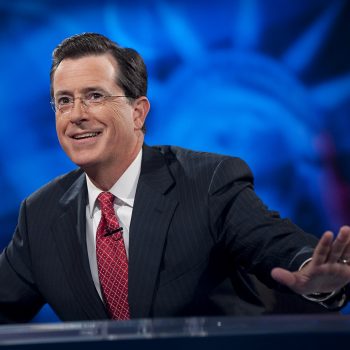As Americans of many political stripes lament the end of the hit show “The Colbert Report,” we wondered how Stephen Colbert’s satirical right-wing, hyper-patriotic persona impacted U.S. politics over the course of the show’s ten seasons. What legacy does Colbert leave behind as he exits “The Colbert Report” to take over the “Late Show” from David Letterman?
To find out, we talked to Sophia A. McClennen, Professor of International Affairs and Comparative Literature at Penn State University. She is the author of several books on the role of satire – and Colbert in particular – in contemporary U.S. political discourse, including Is Satire Saving our Nation? Mockery and American Politics, Colbert’s America: Satire and Democracy, and America According to Colbert: Satire as Public Pedagogy.
McClennen spoke with Footnote about Colbert’s impact on the U.S. political landscape and what was unique about his brand of satire. She shared the important ways he encouraged civic engagement among his audience – from SuperPACs to presidential campaigns – and who might one day take his place as the king of political satire (hint: it’s probably no one).
What purpose does satire play in our current political landscape, and how does it compare to satire of the past?
One of the things that is different about contemporary satire is the fact that it now sets the conversation [in motion], as opposed to simply commenting on it. Historically, satire has happened after the public has received information, thought about it, and satire comes in and offers the audience another way to think about it and ask questions. In today’s landscape, people are often getting their information from satirists first, and there’s a few reasons for that. The U.S. public has a much higher degree of distrust in the [traditional] news media than they previously had, because the news media itself is now so filled with sensation and hype.
The other thing that’s really different about satire today is that it’s now possible for what we call, in the book, “citizen satirists” to really have impact. So it used to be the case that for satirists to [capture] broad public interest, they needed to be professional, they needed to have a platform. But with Twitter, any one of us can have a platform. There are Twitter accounts with 2,000 followers which are creating their own “citizen satire.”
But satire, as a form of comedy, has basic rules to it and there is only so much that can happen to it in terms of changing it and having it still count [as satire]. We have a whole chapter of the book that helps walk people through the difference between satire and mockery. One of the key things is irony, which is that the satirist can’t say what he or she thinks. They have to use a version of figurative language.
How important is the distinction between satire and mockery, especially within the context of “The Colbert Report”? What is the value of having a character like Colbert’s who is so hyperbolic in his political opinions?
Colbert was unique because of his character. He performed in-character satire, which meant that not only was he using irony and not saying exactly what he thought, he was actually embodying the thing he was ridiculing. That is always more complicated because the audience can often get confused, and there’s research that shows that some people never understood that Colbert was in character, which makes a lot of us laugh.1 But the thing is, [Colbert presented] a very particular form of satirical comedy, and that’s one of the reasons why having Colbert leave his character behind is a big loss for satire. In-character satire is a unique form of the art, and losing that piece of it from Colbert is a big deal.
From a political scientist’s perspective, what is the most important contribution “The Colbert Report” made to politics in its tenure on air?
There’s a few. One of the big ones was that, when he decided to open his own SuperPAC, he singlehandedly educated the U.S. public – especially Millennials – on the ins and outs of campaign finance and really showed them how absurd the system has become. By the time of the elections, 8% of all SuperPACs were Colbert-inspired.1 So not only did he open his own SuperPAC, but he encouraged his fans to do so as well. And that is a big deal. You can’t underestimate what that meant in terms of helping citizens understand how money influences our politics.
The other [major impact he had] was when he tried to run for president (twice). When he held a rally with Herman Cain in South Carolina, that moment was sort of epic, because Herman Cain seemed to not get the joke – that he was the joke. There were plenty of times at which Colbert’s direct investment and involvement in politics really helped his viewers understand some of the major issues.
The other thing to remember is, because he did it as a comedian, he helped citizenship become fun. I think that has been his biggest legacy: his viewers were encouraged to participate in the political process, and enjoy themselves while they were doing it. This was a really big change from the old 60s seriousness about politics where you can’t have too much fun. It’s a new definition of citizenship that really is one of Colbert’s most important legacies.
What long-term impact do you think the show will have now that its last episode has aired? Where do you think “The Colbert Report” will end up within the canon of political humor?
I am absolutely certain that Stephen Colbert’s character will go down in history as one of the most important political satire figures of all time. There’s no question about that. We could talk for hours about what exactly he did that was so innovative and so significant. The big question is, will there be any sort of continuity between the Colbert character and Stephen Colbert as host of “The Late Show”? We just don’t have an answer to that yet. Some interviews with Jon Stewart and Colbert himself suggest that there will be some through lines to it. The character will be dead, but there will be some carryover with [the kinds of] satirical insights that we’ve been getting from Stephen Colbert for the last decade.
The other part of the [show’s impact was] what Colbert offered the public in terms of their ability to enjoy themselves while being politically involved. I think he joins a much broader sort of movement, a very interesting synergy between Gen-Xers like Colbert and myself and Millennials like the protesters at Occupy Wall Street and my co-author, Remy Maisel, where somehow the cynicism of Gen-X gets buoyed up by the hopefulness of Gen-Y and the combination is politically powerful. We now have a new model of citizenship in our nation and, despite all the negative hype about core turnout at midterms, I think we have every reason to expect that Millennials will turn out and become extremely engaged in the next presidential cycle. That is an exciting prospect to have a young portion of our population so engaged, and engaged in ways that use satire.
One could argue that “The Colbert Report” could only have existed if we had eight years of George W. Bush as president, along with the brand of patriotism the White House and the media promoted during his term. How was Colbert’s persona shaped in reaction to the political trends of the Bush years? How did it shift after Obama’s election?
What happened with Colbert when Obama stepped in? Well, not a lot. Colbert was, alongside the other satirists, the first to call out Obama or any Democrat when that needed to be done. I mean, Colbert went after Obama on drones viciously, and Obama deserved it. This is constantly one of the biggest misunderstandings about those shows. They were always on the Democrats when the Democrats deserved it.
The second thing that happened after Obama was elected was that the right-wing pundits started getting all agitated about race and saying such outrageous things that it gave Colbert an almost constant diet of stuff to produce and repackage for his audience. And all of those [pundits] who told us we needed to trust our president, shut up and not question the president – [when that president was Bush] – quickly shifted gears and said it’s our job to question our president as soon as it was Obama. Colbert followed suit and acted out the versions of Sean Hannity, Rush Limbaugh, and Bill O’Reilly.
Satire will cease to exist if we have nothing to satirize. Satire feeds off of folly. If no one’s saying anything stupid, if nobody’s making arguments that are illogical, satire has nothing to go on. So that’s what [satirists are] doing. When the White House comes out and tries to give us a justification for why the drone project makes sense, Colbert’s going to jump on it. When Nancy Pelosi makes contradictory comments and reveals herself to have uneven politics, Stewart’s going to jump on it because that’s what his job is. It’s not as partisan as people think. I realize that to some folks that sounds really outrageous, because they think that all these shows are doing is bashing Republicans. The fact is, they’re bashing stupidity, so they’re going to find it where they can.
Thankfully it seems like they’re not going to run out of it any time soon.
When Colbert’s segment “Better Know a District” was on, it was a great way to show the public who the actual people are that we elect to Congress. Again and again, regardless of party affiliation, Colbert reveals that some of these people are not that bright and that’s pretty frightening. When he brought on Georgia congressman Lynn Westmoreland, who was trying to pass a bill having the Ten Commandments [publicly displayed], and Westmoreland couldn’t name the Ten Commandments, it was really funny but it was also really frightening! He had Democrats on that he made look pretty stupid too.
With Colbert’s persona being put in cold storage, who’s next? Is it John Oliver’s “Last Week Tonight” on HBO; Larry Wilmore’s “The Nightly Show”, which will be taking over “The Colbert Report”’s timeslot; or perhaps a citizen satirist who will pick up the mantle?
There were features of Colbert’s character that I don’t see anyone stepping right into. His hyper-patriotism was really important because it helped offer progressives a way to articulate their own commitment to their nation in a way that was different from the right wing. There were just so many features of “The Colbert Report” that I don’t [believe] can be repeated.
I do think that John Oliver’s show is amazing, and it’s a completely new version of satire – Satire 2.0 – because he gets to do much longer bits. His bits are often 15 minutes long, which is stretching the genre, and you can’t do that on regular TV when you have commercial breaks. Oliver’s able to use the longer format to dig into issues at a degree that you can’t in a seven-minute bit. He’s also following in Colbert’s footsteps to the degree that he’s trying to get his fans engaged and often asking them to tweet, to get online, and to do things in response to what he’s got on his show, which I think is exciting.
The other thing that’s exciting is we’re now in a position to watch what’s happened on “The Daily Show” and how Stewart has really cultivated and supported other comedians and has helped bring them up through the ranks, which is exactly what happened with Colbert [and Oliver]. This is what is going to happen, I think, with “The Nightly Show” with Larry Wilmore, and I suspect some of Stewart’s correspondents will show up on that show, people like Jessica Williams and Wyatt Cenac. Having a constant satire for people of color and minorities [through “The Nightly Show”] will be a very big step forward in the landscape. I think that is maybe the next big story – to think a little bit about how Stewarts’ commitment to the power of satire has empowered so many other satirists.
Endnotes
1. Sophia A. McClennen & Remy M. Maisel (2014) Is Satire Saving Our Nation? Mockery and American Politics, New York: Palgrave Macmillan.






